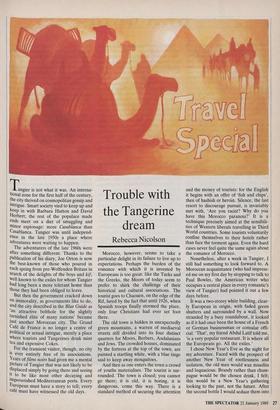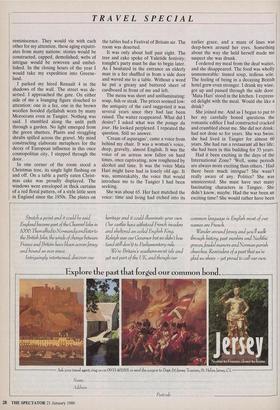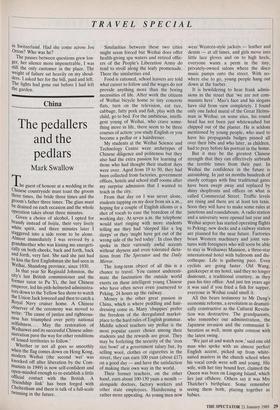Trouble with the Tangerine dream
Rebecca Nicolson
Ta. ngier is not what it was. An interna- tional zone for the first half of the century, the city thrived on cosmopolitan gossip and Intrigue. Smart society vied to keep up and keep in with Barbara Hutton and David Herbert; the rest of the populace made ends meet on a diet of smuggling and minor espionage: more Casablanca than Casablanca. Tangier was until independ- ence in the late 1950s a place where adventures were waiting to happen.
The adventurers of the late 1960s were after something different. Thanks to the Publication of his diary, Joe Orton is now the best-known of those who poured in each spring from pre-Wolfenden Britain in search of the delights of the boys and !cif, well known to the exiles for whom Tangier had long been a more tolerant home than those they had been obliged to leave. But then the government cracked down on immorality, as governments like to do, and the city described in the Blue Guide as 'an attractive bolthole for the slightly tarnished elite of many nations' became Just another Moroccan city. The Grand Café de France is no longer a centre of Political or sexual intrigue, merely a place Where tourists and Tangerines drink mint tea and expensive Cokes. . For the transient visitor, though, no city is ever entirely free of its associations. Years of films noirs had given me a mental Picture of Tangier that was not likely to be displaced simply by going there and seeing it to be like most other decaying and Impoverished Mediterranean ports. Every European must have a story to tell; every cafe must have witnessed the old days. Morocco, however, seems to take a particular delight in its failure to live up to expectations. Perhaps the burden of the romance with which it is invested by Europeans is too great: like the Turks and the Greeks, the Moors of today seem to prefer to shirk the challenge of their historical and cultural associations. The tourist goes to Chaouen, on the edge of the Rif, lured by the fact that until 1926, when Spanish troops finally stormed the place, only four Christians had ever set foot there.
The old town is hidden in unexpectedly green mountains, a warren of mediaeval streets still divided into its four distinct quarters for Moors, Berbers, Andalusians and Jews. The crowded houses, dominated by the fortress at the top of the town, are painted a startling white, with a blue tinge said to keep away mosquitoes.
And then as one enters the town a crowd of youths materialises. The tourist is sur- rounded. The town is closed; you cannot go there; it is old, it is boring, it is dangerous, come this way. There is a standard method of securing the attention and the money of tourists: for the English it begins with an offer of 'fish and chips', then of hashish or heroin. Silence, the last resort to discourage pursuit, is invariably met with, 'Are you racist? Why do you have this Morocco paranoia?' It is a technique precisely aimed at the sensibili- ties of Western liberals travelling in Third World countries. Some tourists voluntarily confine themselves to their hotels rather than face the torment again. Even the hard cases never feel quite the same again about the romance of Morocco.
Nonetheless, after a week in Tangier, I still had something to look forward to. A Moroccan acquaintance (who had impress- ed me on my first day by stopping to talk to Paul Bowles, the American writer who occupies a central place in every romantic's view of Tangier) had pointed it out a few days before.
It was a two-storey white building, clear- ly European in origin, with faded green shutters and surrounded by a wall. Now stranded by a busy roundabout, it looked as if it had once been the house of a French or German businessman or consular offi- cial. 'That', my friend Abdul Latif told me, 'is a very popular restaurant. It is where all the Europeans go. All the exiles.'
I chose New Year's Eve as the night for my adventure. Faced with the prospect of another New Year of rootlessness and isolation, the old men would wax maudlin and loquacious. Brandy rather than cham- pagne would be the chosen drink, I felt; this would be a New Year's gathering looking to the past, not the future. After the second bottle I would seduce them into
TRAVEL SPECIAL
reminiscence. They would vie with each other for my attention, these aging expatri- ates from many nations: stories would be constructed, capped, demolished; webs of intrigue would be rewoven and embel- lished. In the closing hours of the year I would take my expedition into Greene- land.
I parked my hired Renault 4 in the shadows of the wall. The street was de- serted. I approached the gate. On either side of me a lounging figure slouched to attention: one in a fez, one in the brown woollen hooded djellabah worn by many Moroccans even in Tangier. Nothing was said. I stumbled along the unlit path through a garden. No light emerged from the green shutters. Plants and straggling shrubs spilled across the gravel. My mind constructing elaborate metaphors for the decay of European influence in this once cosmopolitan city, I stepped through the door.
In one corner of the room stood a Christmas tree, its single light flashing on and off. On a table a partly eaten Christ- mas cake was proudly displayed. The windows were enveloped in thick curtains of a red floral pattern, of a style little seen in England since the 1950s. The plates on the tables had a Festival of Britain air. The room was deserted.
It was only about half past eight. The tree and cake spoke of Yuletide festivity; tonight's party must be due to begin later. As I hesitated in the entrance an elderly man in a fez shuffled in from a side door and waved me to a table. Without a word he put a greasy and battered sheet of cardboard in front of me and left.
The menu was short and unilluminating: soup, fish or steak. The prices seemed low: the antiquity of the card suggested it was several years since they had last been raised. The waiter reappeared. What did I desire? I asked what was the potage du jour. He looked perplexed. I repeated the question. Still no answer.
'Cream of asparagus', came a voice from behind my chair. It was a woman's voice, deep, gravelly, almost English. It was the voice of an actress now fallen on hard times, once captivating, now roughened by alcohol and time. It was the voice Mata Hari might have had in lonely old age. It was, unmistakably, the voice that would introduce me to the Tangier I had been seeking.
She was about 65. Her face matched the voice: time and living had etched into its earlier grace, and a maze of lines was deep-hewn around her eyes. Something about the way she held herself made me suspect she was drunk.
I ordered my meal from the deaf waiter, and she disappeared. The food was wholly unmemorable: tinned soup, tedious sole. The feeling of being in a decaying British hotel grew even stronger. I drank my wine, got up and passed through the side door. `Mata Hari' stood in the kitchen. I express- ed delight with the meal. Would she like a drink?
She joined me. And as I began to put to her my carefully honed questions the romantic edifice I had constructed cracked and crumbled about me. She did not drink; had not done so for years. She was Swiss; she had lived in Tangier for almost 60 years. She had run a restaurant all her life; she had been in this building for 35 years.
Had it been exciting in the days of the International Zone? 'Well, some periods are always more exciting than others.' Had there been much intrigue? She wasn't really aware of any. Politics? She was uninterested. She must have met many fascinating characters in Tangier. She didn't know, maybe. Had the war been an exciting time? She would rather have been
TRAVEL SPECIAL
in Switzerland. Had she come across Joe Orton? Who was he?
The pauses between questions grew lon- ger, her silence more impenetrable, I was Still the only customer in the place. The weight of failure sat heavily on my shoul- ders. I asked her for the bill, paid and left. The lights had gone out before I had left the garden.




























































 Previous page
Previous page